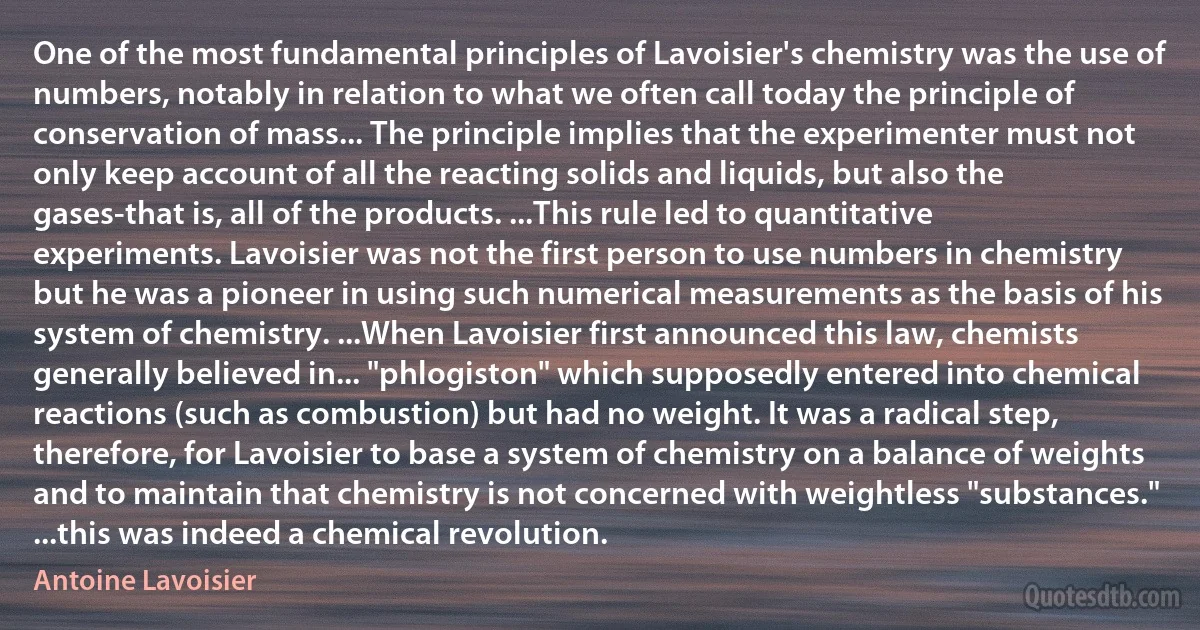
One of the most fundamental principles of Lavoisier's chemistry was the use of numbers, notably in relation to what we often call today the principle of conservation of mass... The principle implies that the experimenter must not only keep account of all the reacting solids and liquids, but also the gases-that is, all of the products. ...This rule led to quantitative experiments. Lavoisier was not the first person to use numbers in chemistry but he was a pioneer in using such numerical measurements as the basis of his system of chemistry. ...When Lavoisier first announced this law, chemists generally believed in... "phlogiston" which supposedly entered into chemical reactions (such as combustion) but had no weight. It was a radical step, therefore, for Lavoisier to base a system of chemistry on a balance of weights and to maintain that chemistry is not concerned with weightless "substances." ...this was indeed a chemical revolution.
Antoine LavoisierRelated topics
account base call chemical chemistry combustion conservation experimenter fundamental law led mass numerical person pioneer revolution rule step use using weight today lavoisierRelated quotes
Unfortunately... the philosophy of Aristotle laid it down as a principle, that the celestial motions were regulated by laws proper to themselves, and bearing no affinity to those which prevail on earth. By thus drawing a broad and impassable line of separation between celestial and terrestrial mechanics, it placed the former altogether out of the pale of experimental research, while it at the same time impeded the progress of the latter by the assumption of principles respecting natural and unnatural motions, hastily adopted from the most superficial and cursory and remark, undeserving even the name of observation. Astronomy therefore continued for ages a science of mere record, in which theory had no part, except in so far as it attempted to conciliate the inequalities of the celestial motions with that assumed law of uniform circular revolution which was alone considered consistent with the perfection of the heavenly mechanism.

John Herschel
The scene has thoroughly changed. The six weeks' march to Paris has come world drama. Mass murder has become a monotonous task, and yet the final solution is not one step nearer. Capitalist rule is caught in its own trap, and cannot ban the spirit that it has Gone is the first mad delirium. Gone are the patriotic street demonstrations, the chase after suspicious-looking automobiles; the false telegrams, the cholera-poisoned wells. Gone the mad stories of Russian students who hurl bombs from every bridge of Berlin, or French men flying over Nuremberg; gone the excesses of spy-hunting populace, the singing through, the coffee shops with their patriotic songs; gone the violent mobs, ready to denounce, ready to persecute women, ready to whip themselves into a delirious frenzy over every wild rumor; gone the atmosphere of ritual murder, the Kishinev air that left the policeman at the corer as the only remaining representative of human dignity.

Rosa Luxemburg
...the principle of the limiting character of the velocity of light. This statement... is not an arbitrary assumption but a physical law based on experience. In making this statement, physics does not commit the fallacy of regarding absence of knowledge as evidence for knowledge to the contrary. It is not absence of knowledge of faster signals, but positive experience which has taught us that the velocity of light cannot be exceeded. For all physical processes the velocity of light has the property of an infinite velocity. In order to accelerate a body to the velocity of light, an infinite amount of energy would be required, and it is therefore physically impossible for any object to obtain this speed. This result was confirmed by measurements performed on electrons. The kinetic energy of a mass point grows more rapidly than the square of its velocity, and would become infinite for the speed of light.

Hans Reichenbach
In my opinion, they are not examples of real conversion. If a person through fear, compulsion, starvation or for material gain or consideration goes over to another faith, it is a misnomer to call it conversion. Most cases of mass conversion, of which we have heard so much during the past two years, have been to my mind false coin... I would, therefore, unhesitatingly re-admit to the Hindu fold all such repentants without much ado, certainly without any shuddhi... And as I believe in the equality of all the great religions of the earth, I regard no man as polluted because he has forsaken the branch on which he was sitting and gone over to another of the same tree. If he comes to the original branch, he deserves to be welcomed and not told that he had committed sin by reason of his having forsaken the family to which he belonged. In so far as he may be deemed to have erred, he has sufficiently purged himself of it when he repents of the error and retraces his step.

Mahatma Gandhi
Since the mid-1970s, there's been an international consensus for resolving the Israel-Palestine conflict. [...] It's called a two-state settlement, and a two-state settlement is pretty straightforward, uncomplicated. Israel has to fully withdraw from the West Bank and Gaza and Jerusalem, in accordance with the fundamental principle of international law, [...] that it's inadmissible to acquire territory by war. The West Bank, Gaza and Jerusalem, having been acquired by war, it's inadmissible for Israel to keep them. They have to be returned. On the Palestinian side and also the side of the neighboring Arab states, they have to recognize Israel's right to live in peace and security with its neighbors. That was the quid pro quo: recognition of Israel, Palestinian right to self-determination in the West Bank and Gaza with its capital in Jerusalem. That's the international consensus. It's not complicated. It's also not controversial.

Norman Finkelstein
